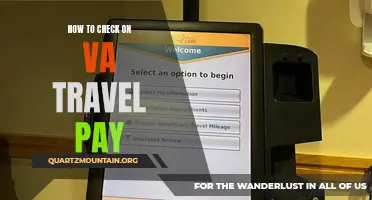
Traveling to another country can be an exciting and exhilarating experience, but it also comes with a fair share of preparation and planning. One crucial aspect that often gets overlooked is understanding the visa requirements for international travel. Whether you're a seasoned globetrotter or embarking on your first adventure abroad, knowing when you need a visa can save you from unexpected hurdles and potential disappointment. From navigating the complexities of visa applications to staying abreast of changing requirements, this guide will provide you with the essential information needed to ensure a hassle-free journey. So, let's dive into the world of visas and explore the fascinating realm of international travel documentation.
What You'll Learn

Countries that require visas for travel
If you are planning to travel internationally, one of the most important things you need to consider is whether or not you need a visa. A visa is an official document issued by a country's government that allows you to enter, stay, or travel through that country for a specific purpose and period of time. While some countries have visa-free agreements with other nations, many countries require travelers to have a visa before they can enter.
Each country has its own visa requirements, so it is important to check the specific visa regulations for the country you plan to visit. However, here are some general guidelines on countries that commonly require visas for travel:
- China: Travelers planning to visit China generally need a visa. The type of visa required will depend on the purpose of your visit, such as tourism, business, or study.
- Russia: Russia is another country that commonly requires a visa for travel. The Russian visa application process can be complex, so it is advisable to start the application process well in advance of your travel dates.
- India: Most travelers visiting India need to obtain a visa before their trip. The Indian visa application process can be done online or at an Indian embassy or consulate.
- Brazil: Travelers from many countries, including the United States, Canada, Australia, and Japan, need to obtain a visa to enter Brazil. The visa application process usually involves providing supporting documents, such as a valid passport, itinerary, and proof of accommodation.
- Saudi Arabia: Saudi Arabia recently started issuing tourist visas, but most travelers still need to obtain a visa before their trip. The application process typically involves submitting an online application and attending an appointment at a Saudi embassy or consulate.
- Australia: Unless you are an Australian or New Zealand citizen, you will need to obtain a visa to travel to Australia. The type of visa required will depend on factors such as the purpose and length of your stay.
- United Arab Emirates (UAE): Travelers planning to visit the UAE, including popular destinations like Dubai and Abu Dhabi, generally need to obtain a visa. Some travelers may be eligible for visa-on-arrival, but it is advisable to check the specific visa requirements beforehand.
- Vietnam: Most travelers to Vietnam need to obtain a visa before their trip, although some nationalities are exempt from visa requirements for short visits. The visa application process can be done online or at a Vietnamese embassy or consulate.
- Egypt: Travelers from many countries, including the United States, Canada, and European Union countries, need to obtain a visa to enter Egypt. The visa can be obtained upon arrival at Egyptian airports or in advance from an Egyptian embassy or consulate.
- Turkey: While Turkey offers visa-free travel for citizens of many countries, travelers from certain countries, including the United States and Canada, need to obtain an e-visa before their trip. The e-visa can be applied for online and obtained within minutes.
These are just a few examples of countries that commonly require visas for travel. It is important to note that visa requirements can change, so it is always advisable to check the latest information from the official government website of the country you plan to visit. Additionally, it is recommended to apply for a visa well in advance of your travel dates to allow for any potential delays or processing times.
Travelling with a Companion: Exploring the Possibility on a Tourist Visa
You may want to see also

Visa requirements based on nationality
As you plan your next international adventure, it is crucial to understand the visa requirements based on your nationality. Each country has different regulations regarding visas, and failure to comply with these requirements can result in denied entry or even legal consequences. To ensure a smooth and hassle-free travel experience, it is essential to know when you need a visa and how to obtain one.
Generally, the need for a visa depends on your nationality and the country you intend to visit. Some countries have visa waiver agreements, allowing certain passport holders to enter without a visa for a specified period. However, most countries require travelers to obtain a visa before their arrival. To determine whether you need a visa and the specific requirements, you should consult the embassy or consulate of the country you plan to visit.
Visa requirements can vary significantly, but there are a few common types of visas to be aware of:
- Tourist Visa: This is the most common type of visa and is usually required for travelers visiting a country for leisure or recreational purposes. It allows you to stay for a limited period, typically ranging from a few weeks to several months. Some countries may offer e-visas, which can be obtained online, while others require a physical application at the embassy or consulate.
- Business Visa: If you are traveling for business-related purposes, such as attending conferences, meetings, or negotiations, you may need a business visa. This visa category often has additional requirements, such as a letter of invitation from a host company or organization in the destination country.
- Work Visa: If you intend to work in a foreign country, even temporarily, you will likely need a work visa. This visa type usually requires a job offer from an employer in the host country and may involve a more complex application process, including background checks and medical examinations.
- Student Visa: If you plan to study abroad, a student visa is usually required. This visa allows you to pursue education at recognized institutions and may come with specific conditions, such as the requirement to maintain full-time enrollment and financial support during your studies.
To obtain a visa, you typically need to submit various documents and pay a processing fee. Common requirements include a valid passport, completed application form, recent passport-sized photographs, proof of travel arrangements (such as flight itineraries), proof of accommodation, and financial means to cover your expenses during your stay.
It is crucial to start the visa application process well in advance of your planned trip. Processing times can vary significantly, and some countries may have limited visa appointment availability. Be sure to check the embassy or consulate's website for up-to-date information on required documents and application procedures. In some cases, you may need to apply in person, while others allow you to submit your application by mail or online.
Remember to carefully review the visa validity and conditions. Some visas allow for single entry, meaning you can only enter the country once during the visa's validity period. Others may permit multiple entries, allowing you to enter and exit as many times as you wish within a specified timeframe.
To summarize, visa requirements based on nationality are an important aspect to consider before traveling internationally. Research and understand the specific requirements for the country you plan to visit, allowing ample time to gather the necessary documents and submit your visa application. By proactively addressing the visa process, you will ensure a smooth and enjoyable travel experience.
A Step-by-Step Guide on Applying for an Australian Travel Visa
You may want to see also

Length of stay determining visa necessity
When planning an international trip, one of the most important things to consider is whether or not you will need a visa to enter your destination country. Visa requirements vary greatly depending on the country you are from and where you are planning to travel. One key factor that determines the necessity of a visa is the length of your stay.
In general, shorter stays often do not require a visa, while longer stays may require one. The specific time thresholds vary from country to country, so it is crucial to research the requirements of your destination before making any travel arrangements.
For many countries, stays shorter than 90 days do not require a visa. This is commonly known as a "visa-free" period or a tourist visa exemption. During this time, you can typically enter the country for tourism or business purposes without obtaining a visa in advance. However, it is important to note that the purpose of your stay must still fall within the permissible activities allowed under the tourist visa exemption.
If you plan to stay longer than the visa-free period, you will usually need to apply for a visa in advance. This involves submitting an application, providing supporting documents, and paying a fee. The visa application process can vary in length and complexity, so it is advisable to start the process well in advance of your planned travel dates.
In some cases, the length of stay that determines the necessity of a visa can be even shorter than 90 days. Certain countries may require a visa for stays as short as 30 days, while others may have different thresholds based on the purpose of your visit. For example, business travelers or individuals planning to work or study abroad may have different visa requirements than tourists.
It is important to note that exceeding the allowed length of stay can have serious consequences, even if you do not require a visa initially. Overstaying a visa-free period or violating the conditions of a visa can result in fines, deportation, or even future travel restrictions. It is essential to familiarize yourself with the specific rules and regulations of your destination country and adhere to them accordingly.
In conclusion, the length of stay is a crucial factor in determining whether you need a visa for international travel. Shorter stays, usually under 90 days, often do not require a visa, while longer stays typically do. However, it is essential to research the specific requirements of your destination and adhere to them to ensure a smooth and hassle-free travel experience.
Exploring the United States: Navigating Travel with an Expired Visa
You may want to see also

Exemptions and exceptions to visa requirements
There are many instances when you may need a visa to travel to a foreign country. However, there are also exemptions and exceptions to visa requirements that you should be aware of. These exemptions and exceptions can vary from country to country and can depend on the purpose of your travel, the duration of your stay, and your nationality. Understanding these exemptions and exceptions can help you plan your trip more effectively and avoid unnecessary hassle or delays. Here are some common examples:
- Visa-free travel: Many countries have agreements in place that allow citizens of certain countries to travel without a visa. These agreements are often based on reciprocity, meaning that the country will offer visa-free travel to citizens of another country if their own citizens are granted the same privilege. For example, citizens of the European Union can travel freely within the EU without a visa. Similarly, citizens of the United States can travel to Canada for tourism or business purposes without a visa for stays of up to 6 months.
- Visa on arrival: Some countries offer visa on arrival facilities, which means that you can obtain a visa upon arrival at the destination airport or seaport. This is particularly common in tourist destinations that want to attract visitors without burdening them with pre-arrival visa requirements. For example, many Southeast Asian countries such as Thailand, Indonesia, and Vietnam offer visa on arrival for tourists from certain countries.
- Electronic Travel Authorization (ETA): An ETA is an online system that allows you to obtain travel authorization without a physical visa. It is a simpler and quicker process, as it eliminates the need for a visa sticker or stamp in your passport. Countries such as Australia, Canada, and Sri Lanka have implemented electronic travel authorization systems for certain nationalities.
- Transit visas: If you are transiting through a country on your way to another destination, you may be exempt from the visa requirement, depending on the duration of your layover. Some countries have specific transit visa exemptions for short layovers, allowing you to remain in the airport without needing a visa. For example, Singapore allows transit passengers to stay for up to 96 hours without a visa, while Turkey allows up to 72 hours.
- Special visa agreements: Certain countries may have special visa agreements in place that allow you to travel without a visa under specific circumstances. For example, citizens of India who hold a valid United Kingdom visa can transit through airports in the UK without needing a separate transit visa.
- Integration and citizenship agreements: If you have acquired citizenship or permanent residency in a specific country, it may grant you visa exemption or allow you to travel with fewer visa restrictions. For example, citizens of member countries of the European Free Trade Association (EFTA), such as Switzerland, Norway, and Iceland, can travel freely within the Schengen Area.
It is important to note that the exemptions and exceptions to visa requirements can change, and it is advisable to check with the embassy or consulate of the country you plan to visit or transit through for the most up-to-date information. Additionally, even if you are exempt from a visa, you may still need to meet other entry requirements, such as having a valid passport, proof of sufficient funds, or a return ticket. It is always wise to be prepared and carry any necessary documents or evidence to establish the purpose and duration of your stay.
Understanding the Importance of a Travel Visa
You may want to see also







